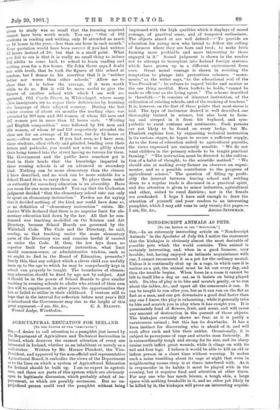AGRICULTURAL EDUCATION FOR IRELAND. [TO TUE EDITOR OF TIM -sellers-roe-1
Sra,—I desire to call attention to a pamphlet just issued by the Department of Agriculture and Technical Instruction in Ireland, which deserves the earnest attention of every one interested in Ireland, whether as an inhabitant or merely as a well-wisher. Written by Mr. Horace Plunkett, the Vice- President, and approved by the non-official and representative kgvicultural Board, it embodies the views of the Department as to the lines on which a system of Agricultural Education for Ireland should be built up. I am no expert in agricul- ture, and there are parts of this system which are obviously Open to legitimate discussion, which probably admit of im- provement, or which are possibly erroneous. But no un- prejudiced person could read the pamphlet without being
impressed with the high qualities which it displays of moral courage, of practical sense, and of tempered enthusiasm. The objects aimed at are well defined :—" To provide an education for 'young men who intend to follow the calling of farmers where they are born and bred; to make Irish farming more profitable and more interesting to those engaged in it." Sound judgment is shown in the resolve not to attempt to transplant into Ireland foreign systems, which have grown up in a different environment from ours. Great moral courage is shown in resisting the temptation to plunge into pretentious schemes, "monu- ments," as the writer says, "to the educational zeal of the Tice-President " : he refuses to regard bricks and mortar as the one thing needful. Even leaflets, he holds, "cannot be made as efficient as the living agent." The scheme described is threefold:—" It consists of itinerant instruction, of the utilisation of existing schools, and of the training of teachers." It is, however, on the first of these points that most stress is laid. The type of instructor desired is well described, one thoroughly trained in science, but also born to farm- ing and steeped in it from his boyhood, and sym- pathetic to rural customs and sentiments. Such persons are not likely to be found on every hedge, but Mr. Plunkett explains how, by organising technical instruction in its various stages, he hopes to secure a sufficient supply. As to the form of education suited to agricultural pursuits, the views expressed are eminently sensible. "We do not want children in the primary schools to be taught practical farming." "The instruction must be directed to the cultiva- tion of a habit of thought, to the scientific method." "We should aim at making every farmer an observer, an experi- menter, and so a possible contributor to the progress of agricultural science." The question of filling up profit- ably the interval between leaving school and settling down to a regular trade is discussed in a practical spirit, and due attention is given to minor industries, agricultural and other, suited to rural districts ; nor is the female sex overlooked. I hope I have said enough to draw the attention of yourself and your readers to an interesting pamphlet, which I may add runs to only twenty-five pages.—


































 Previous page
Previous page